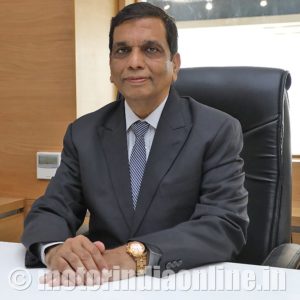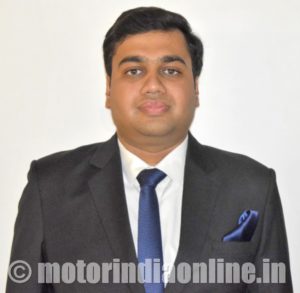Many of us would have seen a prime mover attached to a long trailer carrying a large wind blade on the National Highways. While a lot of motorists would overtake it, and go past it, abusing or cursing the truck driver, little would they think about the management that has gone into such an oversized cargo transport. Known as Over Dimensional Cargo (ODC), there are many logistics firms in the business of handling such oversized cargo in our country. The growth in the number of such companies is testimony to various infrastructure developments in areas such as power, steel and cement plants.

In our quest to understand how the fleet operator manages such loads and what are the challenges they encounter en route, we caught up with Mr. Archit Agrawal, Executive Director, Globe Ecologistics (GEPL) Pvt. Ltd. He said: “We primarily cater to windmill, power, oil and gas industry in the ODC segment and majority of business is on a load-to-load basis, and that’s how the rates are decided too. We do long contracts and keep our vehicles with a client only if the business is guaranteed like there is a lot of movement in the windmill segment and we obviously prefer such large volume-based contracts.”
ODC also can be categorized under two types, one is normal ODC and the other a specialized ODC. Specialized ODC is when you need either telescopic trailers or hydraulic axles with a customized planning. Purchasing vehicles is the easy part, it is the planning and execution that makes the difference. That is where GEPL’s expertise lies.
Mr. Agrawal observed: “We have been doing this for the last 25 years. We began with the oil rigs transportation where a client will provide us with the complete packing list; with experience we know what material will be needed first at the unloading site, based on that the loading is decided and prioritized. Our work is to compact the process to ensure faster erection at the new site. Most of the equipment that we transfer is running on a per operating day basis rental hence prioritization is essential. The rig companies are being paid by the oil companies on a per day basis divided into hours. So, any loss of a few hours is crucial as well, hence we must be efficient. Our task is to optimize the process. The quicker we finish our work, quicker their billing cycle starts.”

Preparation for application
In case of ODC movements, generally the sites are located in remote locations. If mutually agreed the transporter will undergo the road survey, GEL will plan and manage the challenges on the route. “If agreed with the client we will plan the widening of the road, check how many bridges come in the way and any over-head wires that can affect the consignment and do the needful. Sometimes even the clients are proactive in this and they specify the routes and help in removing the hurdles as they have load coming in to one site from various transporters,” informed Mr. Agrawal.
Since GEPL primarily focuses on consignments of upto 200 tonnes, other than the hydraulic trailers, they boast of telescopic trailers which are 45 to 52 metres long when extended which are specifically designed for wind blade application. These are from the stables of Goldhofer, Faymonville, Cometo and VMT. It is keeping this in view that a transporter must use a hydraulic axle against the mechanical one over and above 32 tonnes. “Above 32 tonnes, one has to use hydraulic axles, as per CMVR, upto 32 tonnes you can use mechanical vehicles. The segment that exists between 32 to 80 tonnes, is a very high-volume segment compared to the other ODC segment. But for them to move in hydraulics becomes a jump in cost which is significant when they move from mechanical axles to hydraulic axles. So, we are working towards a more economical solution through our association and our clients. The solution could be to amend the current trailer code to go beyond the 3-axle mechanical trailer, by getting 4 and 5 axles mechanical trailers as in the International market. This can increase the load at an economical cost,” said Mr. Agrawal.
Today for an ODC movement GEL has around 25 pullers and around 150 axles. He further disclosed: “We also have regular mechanical trailers and telescopic trailers which are specifically for wind blade application. Our major fleet is for ODC application, around 250 to 300 fleet (pullers, trailers, axles everything included) is catered to the ODC majorly from Tata Motors and Volvo. Apart from the international trailer makers, we also have bought trailers from the local supplier, Vishwakarma Machine Tools (VMT), producing hydraulic axle as well as telescopic trailers,” informed Mr. Agrawal.
Areas of improvement
As per the MoRTH guidelines, transporters moving ODC and OWC (Over-Weight-Cargo) on national highways need to seek prior permission from the Ministry of Road Transport and Highways (MoRTH). The load is also required to be maintained within the permissible limit. This is in for safeguarding structural assets such as bridges on the national highways.
Mr. Agrawal felt while seeking permissions is a good step and welcomed the online process of doing so, the same has to be done for the State highways, for which the States need to be digitally connected.
“We need to bring the permissions online for the State highways as well. If I get a load of 80 tonnes from Ahmedabad to Chennai, I will cross Maharashtra, Karnataka and then I will enter TN so have individually deal with each State’s RTO where some do have a permission system and some do not. If there is a delay in permissions my vehicle will be standing idle at a State border till I acquire permission. We must calculate all that when we commit to a client. Delay at one point affects everybody,” opined Mr. Agrawal.
Representatives from the Hydraulic Trailers Owners Association which included Mr. Ramratan Agrawal, the father of Mr. Archit Agrawal, said BEML Ltd. and BHEL amongst those instrumental in getting permissions online from MoRTH. They are working towards streamlining the process to the State levels as well in the future.
Another area of improvement that concerns the GEL Executive Director is the basic facility of sanitation, food and rest rooms for drivers. He said: “The Government should increase amenities for drivers on the roads, if the driver is on road for 10-15 days and he doesn’t get to sleep well. Govt should create parking bays and rest areas on National Highways across the country. Let those facilities be chargeable but drivers need basic facilities. If done under the Swachh Bharat Abhiyan, Government can achieve two aims at once and create a more conducive ecosystem for drivers of the nation.”


